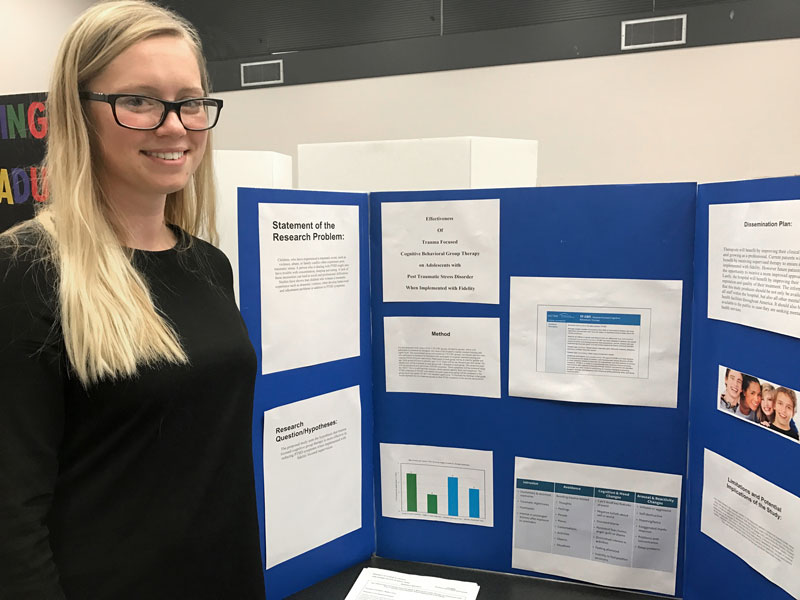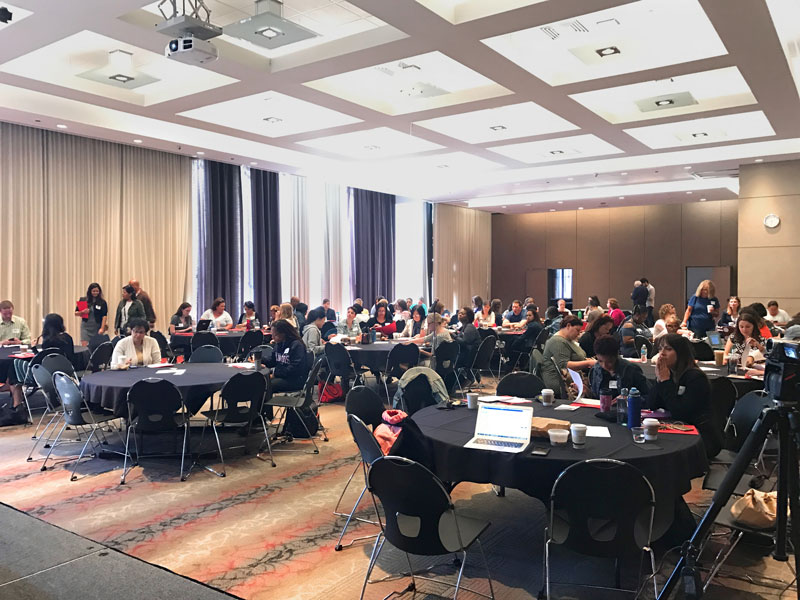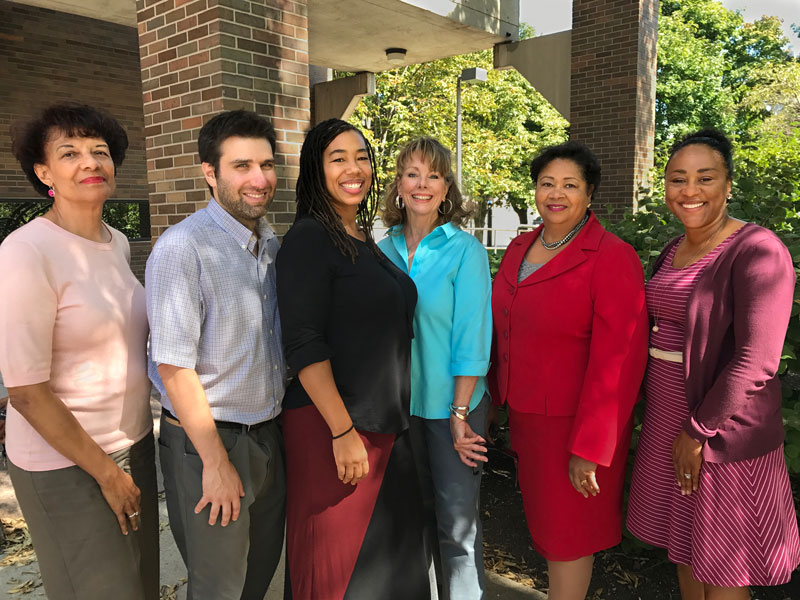JACSW at the Forefront of School Social Work

“Twenty percent of children in school may be struggling with a mental health issue, and 80% of those students will not get mental health treatment outside of school.”
Clinical Assistant Professor Annette Johnson, who heads the MSW specialization in school social work, presents such statistics to highlight the growing need for social workers in schools.
“Many people have underestimated the amount of support that is both needed and being provided in schools,” she adds. “Schools are second only to young peoples’ homes for where they spend most of their time, so schools are the most likely place where these problems will be identified.”
Schools are second only to young peoples’ homes for where they spend most of their time, so schools are the most likely place where mental health problems will be identified.
Annette is in a good position to know about this. Before joining the college, she worked for nearly 25 years in Chicago Public Schools (CPS), 18 of those years as director of social work. It was during her time with CPS that she began to understand how many school age children are dealing with issues of mental health.
Social and Emotional Learning Heading link

The college’s school social work program is founded on the understanding that social workers need to care for the whole individual, not only a single aspect or only for the near term. In the context of s
chool social work, addressing students’ short-term academic performance is important, but we emphasize their long-term social and emotional development, both to deal with mental illness and to develop skills and resources they’ll need to be successful beyond middle school or high school.
A unique aspect of the college’s school specialization is the use of Critical Service Learning (CSL) as a primary technique for social and emotional learning. CSL is a strengths-based approach that empowers students to identify their own inherent strengths, and then apply those strengths in a community-based service project.
CSL is an integral part of the school social work curriculum. In their internships at schools throughout the Chicago metropolitan area, second year MSW students implement a CSL project with the young people on their case load. For example, one MSW student worked with a group of young people who had lost someone to gang violence and had been identified as at-risk of becoming gang members. For their CSL project, the group created a public service awareness campaign to address the issue of gang violence in their community. To assess how the project improved their social and emotional wellbeing, the youth were given a social responsibility assessment before and after undertaking the project; the average pre-test score was 4.0, and the average post-test score was 5.5, demonstrating a dramatic increase in overall social responsibility.
In general, what results from CSL is that students experience, perhaps for the first time in their lives, a sense of real accomplishment from being a contributing member of a group, creating and implementing a project from start to finish, and making a positive impact in their school or in their community. And the adults involved get to see the students, who they may have previously considered “difficult” or “troubled,” as manifesting positivity, competence and community involvement. The experience can be transformative not only for the students, but for their parents, their teachers, and school administrators.
A Systems Level Approach Heading link
Another defining aspect of the college’s school specialization is the emphasis on the macro and mezzo, as well as the micro levels of social work. The needs of the individual student are the primary focus, but school social workers must maintain a larger perspective to mitigate what may be impairing the student.
School social workers are called upon to wear many hats. They connect students to resources within the school, but also in the larger community. They must engage the student’s parents, and perhaps even their siblings. They may sit on leadership committees, or they may provide services to teachers and staff to help them deal successfully with students.
Clinical Assistant Professor Julie Fisher, who facilitates the post-MSW PEL program, recalls that when she was a school social worker she worked with local merchants whose stores students passed after school, to ensure that what those merchants displayed was appropriate for young students. “The footprint of a school social worker can go far,” she observes.
In addition, we train social workers to keep an eye on developments in policy at the local, state or federal levels. To help school practitioners keep up with developments, we issue a yearly School Social Work Policy Practice Brief. This year’s brief focused on Illinois Senate Bill 100, which amends school codes relating to disciplinary action with students.
Training Social Work Professionals Working in the Field Heading link

Another point of distinction for the JACSW school social work program is its focus on helping working professionals to remain current and advance in their profession.
The Training Institute for School Social Work Professionals is an annual day-long conference with a different focus each year. The 2017 institute was entitled “Successful Strategies for Meeting Students’ Mental Health Needs.” It was attended by more than 120 social workers, educators and other professionals from throughout Illinois and from neighboring states. The event featured a keynote presentation and six workshops on topics such as the impact of exposure to trauma on students, effective interventions for working with ADHD, and a strengths-based approach to engaging students with autism.
Similarly, the Post-MSW PEL (Professional Educator License) program prepares social work professionals to become eligible for the ISBE PEL School Social Worker Endorsement application process. It is one of few PEL programs that offers coursework entirely online, which is a benefit to working professionals.
Keeping an Eye on the Future Heading link

Part of the college’s approach is to get in front of trends as they’re developing, produce a model for implementation, then share it with as many practitioners as possible.
For example, Annette Johnson envisions a time when service agencies will provide ever more services directly in schools. “This is not new,” she says, “but it’s happening more and more. And principals aren’t trained for that, they don’t know how to do that. So, we’ll have to prepare our students to have more leadership qualities, so they can better coordinate with the agencies and school administrators to better serve youth.”
“We’ll also be preparing our students for how to function in different political climates,” she adds. “For example, how immigration issues and policies impact schools and students. And this gets directly to the heart of the Jane Addams mission of achieving social justice.”
The program also strives to stay current with technology. Julie Fisher uses a blog as part of her online PEL program, and this semester will begin using Skype to confer with PEL students and their internship supervisors, “because that’s where students are now, and we always have to be ready.”
It will also be important to understand differences in students who are coming into the MSW program. Younger generations will have different attitudes and expectations, and different ways of looking at ethics and society. “Our social work curriculum must be prepared to meet the students, understand where they are and where they’re coming from, and be able to take them to a different level,” Johnson observes.
“It will always be important to address the changing needs of our MSW students,” she says, “so they will be prepared to meet the changing needs of youth in our schools, as well as in the community.”